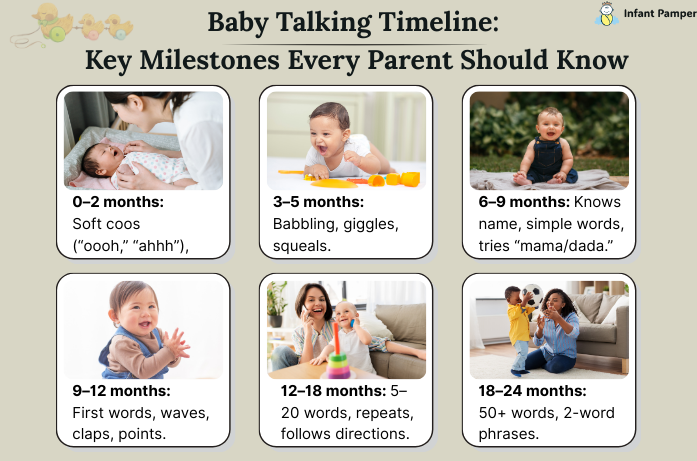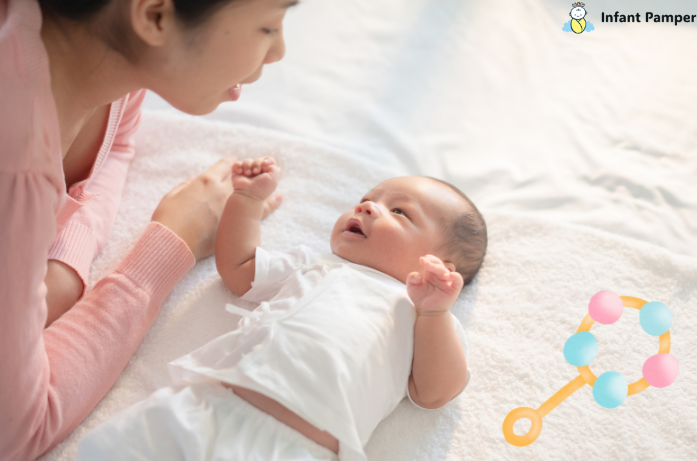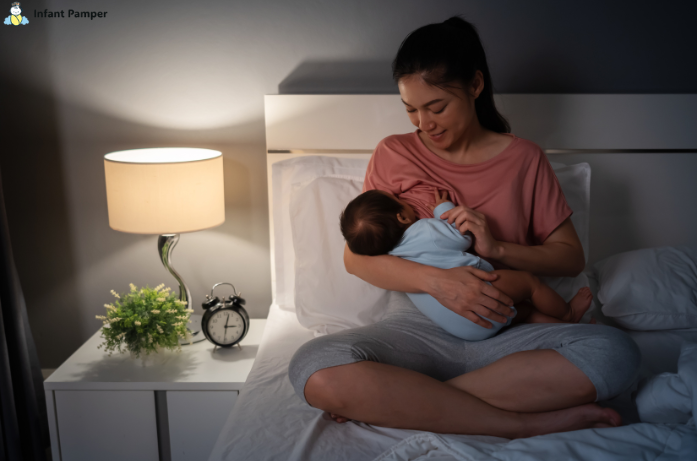By a caring mom at Infant Pamper
There’s nothing quite as magical as hearing your baby say “mama” or “dada” for the very first time. That tiny voice feels like music, and suddenly all the sleepless nights feel worth it. But here’s something many parents don’t realize: your baby starts “talking” long before those first official words. Every coo, giggle, squeal, and babble is part of their incredible journey toward baby language development.
In this guide, we will go into when babies start talking, language milestones through different age periods, what you can do to encourage its development, and when to seek help should you have your concerns. As parents, we do not merely watch the journey; we take an active part in it.

Baby Talking Timeline: Key Milestones Every Parent Should Know
Of course, every child grows at his or her own speed, but here is a handy timeline for typical infant communication milestones:
- 0-2 months: Babies start producing soft cooing noises; these are vowel-like sounds (“oooh” or “ahhh”), showing that they’re experimenting with their voice.
- 3-5 months: Babbling begins! Prepare for those adorable sounds such as “ba-ba,” “da-da,” or “ga-ga.” Your baby may laugh and squeal back at you, American Academy of Pediatrics.
- 6–9 months: They will recognize their name, will respond or react to the tone of your voice, and can start to pick up on simple words like “no” or “bye-bye.” Some babies might go so far as to try to utter “mama” or “dada.”
- 9–12 months: This is when the first words will start developing! Becoming intentional about “mama,” or “ball.” By the end of the first year, many babies will wave, clap, and/or point to communicate.
- 12–18 months: The vocabulary grows to 5-20 words, and toddlers may repeat words they hear and even follow simple instructions.
- 18–24 months: Vocabulary literally shoots up to 50+ words as little toddlers start combining words with phrases like “more milk” and “bye-bye mama.”
- 2–3 years: Sentences start being produced and much of what your toddler says can be understood by the least strangers.
The milestones here are based on guidelines from the CDC and National Institute on Deafness and Other Communication Disorders (NIDCD) provides comprehensive resources on speech and language development.
How Speech Really Begins
Language development, believe it or not, starts well before birth. Around the third trimester, babies would be able to hear sounds in the womb. Your voice becomes mixed with their heartbeat and even music to become one of their earliest memories. Then, the newborns cry as their first communication, and every coo, grunt, and giggle is practice for later speech.
Lovely aspect: the more interaction that takes place, the faster they learn. Babies are imitative, by nature. When you smile at them, repeat their sounds, or make eye contact, you are telling them that communication matters.
The Power of “Parentese”
Have you ever found yourself talking to your baby in a playful, sing-song way? This kind of speech is called parenthesis, and it’s more valuable than you might imagine.
True baby talk might be something like goo-goo or ga-ga; however, parentese is really just normal words with a caring voice, almost like a lullaby, with slow pace and clearly enunciated words. Talking this way helps the baby learn several things, such as:
- Attuning to the rhythm of normal language
- Recognizing and understanding words with ease
- Feeling safe, cherished, and emotionally connected with their maker
So next time you say, “Who’s the cutest baby? YOU are!” in that cheerful, musical voice, know that you’re not just being sweet, you’re actually helping your baby’s brain grow.
Everyday Ways to Increase Baby Speech
The best part of this is that in helping your child talk, there is no need for flashcards or apps. Those simple moments in everyday life become the most powerful learning opportunities. Here are some ideas from parents:
- Narrate your day: Describe everyday routines, such as, “We’re putting on your socks,” or “Let’s open the window.” This way, vocabulary builds naturally.
- Answer the babbles: Treat all your baby’s babbling as though you’re speaking to them. If they say, “Ba-ba?” respond, “Yes, ba-ba!” This kind of interaction helps teach the give-and-take of conversation.
- Read every day: Choose easy board books with lots of pictures. Point to things, say their names, and let your baby turn the pages. Singing nursery rhymes is great, too.
- Ask questions: Even though your baby can’t answer yet, build comprehension with questions like, “Where’s the doggy?” or “Do you see the ball?”
- Label everything: Point to objects and say the word-something is a spoon, cup, or shoe. Repetition is important.
- Use gestures: Waving hello, giving high fives, clapping, or pointing can help actualize communication. Some parents also introduce baby sign language for certain words like “milk” or “more.”
- Put limits on screen time: Apps and cartoons can never substitute real-life conversations. Talking face-to-face with you is what strengthens their language pathways.
When to Seek Support
Remember that children develop at their own speed. Some begin very early with their chatter; others take their own sweet time. Here are some signs to look at and talk to your pediatrician about:
- No babbling by 9 months
- First word not spoken by 15 months
- Not pointing, waving, or gesturing by 12 months
- Fewer than 15 words by 18 months
- Does not readily respond to simple directions after age 2
Trust your intuition; If milestones seem delayed, early support from a speech-language pathologist can help prevent ongoing speech delay.
How Parents Shape Baby Talking Stages
Here’s another reminder for the tired parent everywhere: you’re your child’s first teacher. Every silly song, story, or small talk is doing more than entertaining-they’re wiring that child for communication:
- Talking while cooking, this is language learning.
- Singing along in the car; this is an exercise in rhythm and memory.
- Sharing laughs over foolish words; this is social bonding.
Go ahead-they do not need perfect grammar or big words yet. What they need is your voice, smile, and love.
FAQs About Baby Talking
1. When do babies usually say their first word?
Most babies sound their first true words between 9 and 12 months, some earlier, some later.
2. What is the difference in babbling and words?
Babbling is babble! It is more or less the repetition of sounds; “ba-ba” for instance. First words, however, go with intention, like saying “mama” when sighting you.
3. Should I worry if my toddler is not yet talking?
Not necessarily. Each kid is distinctive. In case the milestones are seriously late, go to your pediatrician for confidence and perhaps early support.
4. Are bilingual parents confusing their child?
No, babies are wonderful language learners. The exposure to two languages actually works to promote brain flexibility, although first words may appear a little late.
5. Are baby sign language and gestures helpful?
Yes, they help babies communicate before they can speak. It doesn’t delay speech, it actually supports it.
Final Thoughts: Your Voice Is Their Foundation
From coos to first words, speech would be one of the most rewarding parts of parenting. Remember, your baby does not just learn language, he learns it from you. Every cuddle, every nursery rhyme, every silly noise, is all cementing their ability to express themselves.
So celebrate all milestones, whether big or small. That very first “mama” or “dada” will come eventually…in the meantime, treasure the giggles and babblings that encompass all the chit-chat among themselves.
At Infant Pamper, we will support you through every step of parenting, from sleepless nights to joyous first words. Find more guides, tips, and honest parent advice to nurture your little one with confidence.




